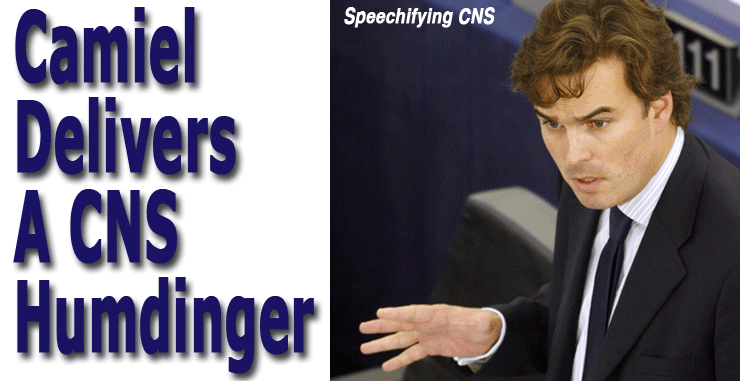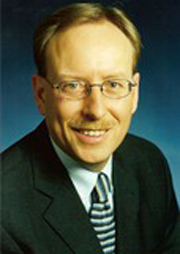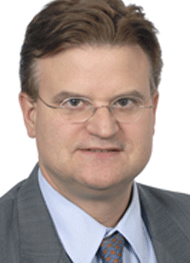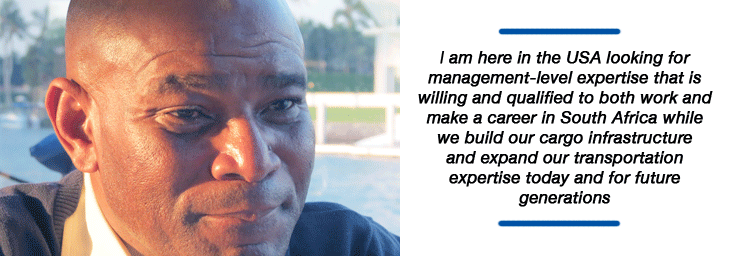
As IATA’s 22nd Annual Cargo
Network Services (CNS) Partnership Conference opened yesterday (Monday,
May 7), a hopeful crowd was on hand, filling up the entire room at
Turnberry Isle Hotel and Resort in Miami. The event is set against
the backdrop of continued global economic weakness and uncertainty.
The opening remarks by Michael Vorwerk
stunned the gathering—the CNS President surprised everyone with
the news that he was quitting his post to return to Lufthansa (see
item).
 Mr.
Vorwerk’s remarks were followed by Mick Fountain, (left) CNS
advisory board chairman, who summed up 2011 by concluding it had been
a productive year—modernizing the agency agreement, starting
implementation of a single, integrated CNS database that eliminates
mailing paper documents and offers 24/7 access to its participants,
and the e-version of the agency handbook. Mr.
Vorwerk’s remarks were followed by Mick Fountain, (left) CNS
advisory board chairman, who summed up 2011 by concluding it had been
a productive year—modernizing the agency agreement, starting
implementation of a single, integrated CNS database that eliminates
mailing paper documents and offers 24/7 access to its participants,
and the e-version of the agency handbook.
The rest of the presentation was the
usual ho-hum e-AWB and e-freight creeping progress, with mention of
the success between CBP (Customs and Border Protection) and its Canadian
counterpart to accept seamless transborder e-freight.
CASS processing costs, Mr. Fountain
noted, were down for a total of more than 5 billion USD in settlements
during 2011.
CNS is happy with itself and so too
is the CNS Advisory Board, having grown accustomed to the feeling
while executive power and the real board is now entirely and firmly
in IATA’s hands.
Camiel Eurlings, the 38-year-old chairman
of Air France/KLM Cargo delivered the keynote speech.
Eurlings, a veteran politician of 17
years who had previously served as transport minister for the Netherlands,
knows how to speechify, and his presentation at CNS was a real humdinger.
Camiel referenced his erstwhile work
as a logistics engineer and listed his first impressions upon returning
to the industry—too much paper, too much opportunistic behavior,
and the need for long-term commitments and increasing quality.
He went on to say that “it is
a time of change and transition and shaping the future” and
therefore “facing our share of challenges we cannot remain in
reactive mode.”
Economic, demographic, environmental,
and competitive issues were cited as factors (together with rising
fuel and transportations costs in the face of faster growth for emerging
economies) that are overtaking the developed world.
All these impact the air cargo business,
presenting challenges and opportunities.
Mr. Eurlings mentioned alliances and
partnerships, both horizontal and vertical, as the means to work together
with all the partners in the logistics chain in order to create “together
toward tomorrow.”
The example of his airline using a Martinair
freighter to fly flowers directly from China to Kenya, then on to
Europe, was an innovative route.
Another is the joint venture with Delta
Cargo as the most integrated cooperation since the 90s, which shows
real results.
SkyTeam Cargo got the nod as the most
effective cargo alliance around, with seamless connections, safe,
secure, and reliable “logistic chain integrity throughout.”
Leveraging his former government experience
and connections, the TSA and the Netherlands have worked out a security
agreement using a risk-based approach with the least possible disruptions
to the supply chain. Getting closer
to home, Camiel advocated measures such as forwarders paying for “no
show” cargo in order to raise the mutual commitment of the parties
and enhance quality control in the supply chain.
While environmental concerns needed
compliance, and experimenting with biofuel showed that it had higher
energy performance than kerosene, currently its production costs were
five times higher. Global cooperation was therefore needed to develop
alternative fuels. The conclusion: there is need to change the industry
for the long term through sustainable partnerships.
Judging by the enthusiastic applause
at the end of his remarks, if Camiel's next sentence had been, “I
need your vote to serve as CNS President,” this crowd would
have elected him in a landslide!
 Things
got off to a dubious start at the big IATA Cargo Network Services
(CNS) Partnership Conference, taking place this week in Florida.
Michael Vorwerk, CNS President opened the event by announcing
that he is quitting his job. No replacement has been named. Things
got off to a dubious start at the big IATA Cargo Network Services
(CNS) Partnership Conference, taking place this week in Florida.
Michael Vorwerk, CNS President opened the event by announcing
that he is quitting his job. No replacement has been named.
Michael informs the cargo community
that after the three-year CNS stint, he is returning to Lufthansa
Cargo in Frankfurt as head of Germany business development.
2012 has become the year when
almost every top executive at the German national carrier, usually
in attendance at past CNS Partnerships, have elected not to
attend CNS.
So Vorwerk returns to Lufthansa
as IATA must now search for his replacement.
“They are looking for a
house shoe," said one attendee at this year’s CNS
Partnership to FlyingTypers.
|
Talking about oil and fuel, what followed
was Charles Schlumberger, principal air transport specialist for the
World Bank, who is, as he put it, a lawyer, banker, and aviator instrumental
in the logistics business in France (he’s a Swiss) in the early
90’s, prior to joining the World Bank 17 years ago.
By the way, about one third of the morning
opening program attendance had debarked by this time, and they missed
a wealth of data and a flurry of charts.
 Mr.
Schlumberger (right) noted that freight was indeed in decline with
less cargo but more capacity, and saturated markets in North America
and Europe with South America faring remarkably well and most of growth
taking place in Pacific Asia. Mr.
Schlumberger (right) noted that freight was indeed in decline with
less cargo but more capacity, and saturated markets in North America
and Europe with South America faring remarkably well and most of growth
taking place in Pacific Asia.
The Middle East was growing, albeit
from a very low base.
The industry as a whole has not been
profitable, with the U.S. alone at a minus 8 billion dollars by now.
If one is a banker, it is hard to raise
money and invest in the airline industry. Safety was mentioned as
presenting a global challenge for cargo with “catastrophic effects”
in the case of aircraft lost to incidents involving batteries.
In terms of security, the industry has
reached a very high level, but needs to look at the cost of doing
business, which cannot get out of hand.
The remainder of Mr. Schlumberger’s
remarks were devoted to oil, examining it from many perspectives and
offering sometimes almost too much data, but with much energy and
revealing results.
The volatility in crude oil has been
considered the main culprit that may have actually triggered the 2008
financial crisis, as some suspect high oil prices caused the mortgage
bubble to burst, with households spending so much more on fuel that
there wasn’t sufficient money left to pay the mortgage.
What is one to do? Hedging on oil prices
is expensive and rather short term.
Data provided showed that for a period
of about ten years, up until 2003, there was ample supply, after which
it tightened. A 4-5 percent increase in global oil and energy prices
causes serious damage and brings the world economy to a crisis—it
is simply something the economy cannot handle. While speculation has
an effect, it accounts for between 10-15 percent of the price, but
it is short term. A comparison of natural gas and oil showed significant
lifecycles, with about five years of productivity for a gas well versus
fifty years for an oil well.
Consumption has been rising in China
and India and leveling off in the US and in Europe, where it used
to account for about 1 percent of GDP and is nearing 5 percent. Per
capita consumption in the U.S. is double to that in Europe and China,
at 20 percent of the U.S. Supplies have been decreasing historically
and a potential crisis may erupt if consumption isn’t curbed
or the threshold of USD 4.75 per gallon is reached, which is deemed
to trigger “global demand destruction.” The combined consumer
and government debt—at four times GDP ratio in the US—are
another aggravating factor.
Although shying away from predictions,
Mr. Schlumberger listed a few things in the category of “good
news,” such as the potential for the U.S. and Canada to become
net exporters if everything works out (who knows?), including shale
oil and oil sands.
For aviation, new, much more fuel-efficient
aircraft were needed; although the newest B787 is 20 percent more
fuel efficient than an MD11, it isn’t enough on a large, aggregated
global scale. Economic recovery and growth in world trade will positively
impact air cargo—an industry that is safe and secure.
Oil and financial challenges remain,
the unknown factors being the availability and affordability of energy.
The presentation material is available online at: www.worldbank/org/airtransport
It is worth noting that nobody brought
up the fact that Delta Airlines has apparently just bought its own
Pennsylvania oil well, as announced in the media last week.
Unfortunately, the conference room audience
dropped to about 60 percent by the time the e-Business panel started,
all the way to about 20 percent for the mid afternoon session on the
“Sustainability of the Air Cargo Industry,” to fewer than
40 people for the last session of the day “RFID – the
Air Canada piece level tracking case study.”
Whether attendees thought the sessions
were uninteresting or they just had something more pressing to do,
like network, which is always top agenda at CNS Partnership, is yet
to be determined.
The point can be made (based on attendance)
that after a few opening speeches and despite the effort to make them
interesting, these sessions appear lost on this crowd and on balance
can be described as a waste of time and effort.
But in the RFID Air Canada case, CNS
Partnership conferees missed an opportunity to learn from a real,
fully functional, automatic identification project that has gone through
all the phases—from pilot to proof of concept.
Ted/Flossie
|




 Mr.
Schlumberger (right) noted that freight was indeed in decline with
less cargo but more capacity, and saturated markets in North America
and Europe with South America faring remarkably well and most of growth
taking place in Pacific Asia.
Mr.
Schlumberger (right) noted that freight was indeed in decline with
less cargo but more capacity, and saturated markets in North America
and Europe with South America faring remarkably well and most of growth
taking place in Pacific Asia.
